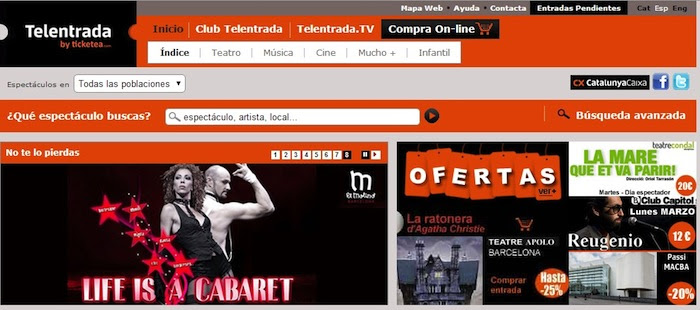Following a $4 million Series B round last May, Spanish ticketing startup Ticketea has been on a mini shopping spree. In February it purchased software development company Telémaco Sistemas, and today the startup has acquired legacy ticket sales service Telentrada from Spanish bank CatalunyaCaixa, as the latter divests from non-banking activities following reform approved by the EU. The acquisition price remains undisclosed, but what is clear is that this is somewhat of a coup for five year-old Ticketea. Out with the old — Telentrada has been operating since 1994 — and in with the new.
Claiming to be the leading Spanish platform for event promotion and ticket selling in Spain, Ticketea competes with market leader Ticketmaster for big events, or something like Eventbrite at the DIY ticketing Long Tail. Its platform solves the problem of both event discovery for consumers and a way to sell tickets for event organisers. “We try to simplify the way everybody can promote, manage and sell their tickets online,” co-founder and CEO Javier Andres told TechCrunch last year.
Ticketea’s platform includes features such as support for Apple’s Passbook, integration with Facebook, a free access control tool for event organizers called “Ticketea checkpoint”, reserved seating functionality, including the ability for event organizers to create their own seating chart, and full localisation (language, currency and payments) for the countries it targets. It also offers a POS iOS app dubbed “Box Office” that lets venues sell tickets on the spot.
The startup’s revenue model is freemium: It’s free to publish and promote an event, and if tickets are free, using this part of the service is also free. For events that charge for tickets, Ticketea takes a commission of 10% for every ticket sold.
Today’s acquisition of Telentrada gives Ticketea access to a significant local customer database — Telentrada currently has 357,000 “users” — and a number of large events to service. These include the Teatro Español, all theatres in ADETCA (the Association of Theatre Companies of Catalonia), the Sitges Film Festival, the international classic theatre Festival of Almagro and a number of plays staged in Barcelona and Madrid, as well as tickets for top museums and cultural sites such as Gaudi’s La Pedrera in Barcelona.
